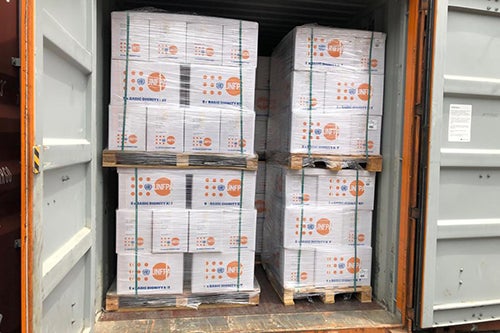News
Pandemic complicates humanitarian crisis in Venezuela and surrounding countries
- 15 May 2020
News
CARACAS, Venezuela/PACARAIMA, Brazil – News of the COVID-19 pandemic had not reached Horihanny Del Valle, a pregnant 16-year-old migrant from Venezuela, until a few weeks ago, when she heard about the coronavirus from friends. “I saw people talking about and it scared me,” she recalled.
Horihanny left Venezuela a year ago with her family, hoping to find more opportunities. Today, they live in Pacaraima, Brazil, just over the border from Venezuela. She is one of 15 people crowded into a small rented house.
Last week, Horihanny attended a UNFPA information session on how to protect herself from COVID-19. She also received a dignity kit, which contains essential personal hygiene items including hand sanitizer, soap and sanitary pads.
She plans to share the materials and the disease-prevention information with her family.
The pandemic has complicated the humanitarian situation in Venezuela and surrounding countries like Brazil.

Venezuela’s economic crisis has triggered a mass exodus of migrants and refugees, with significant humanitarian needs both inside and outside of the country.
Within Venezuela, health facilities lack sufficient medical supplies, a situation that has had severe repercussions for women and girls. For instance, there is an estimated 80 per cent shortage in contraceptive supplies, and a critical shortage of safe blood supplies, which are needed to manage labour complications like postpartum haemorrhage.
The consequences have been dire: The number of maternal deaths in Venezuela increased by nearly 66 per cent between 2015 and 2016. The country also has high rates of adolescent pregnancy and low coverage of HIV testing for pregnant women, as well as low treatment rates for HIV-positive pregnant women.
The pandemic threatens to further reduce health system capacity.
To shore up health services, UNFPA worked with the Pan American Health Organization and UNICEF to deliver 90 tonnes of health, water, hygiene and sanitation, and education supplies to the country last month.
The shipment, which was partially funded by the United Nations Central Emergency Response Fund, included 28,000 personal protective equipment kits for health workers on the front line, as well as oxygen concentrators, paediatric beds, water quality control products and hygiene kits.
“Inputs arriving in the country will contribute to maintaining access to life-saving sexual and reproductive health services in the complex situation and dynamics generated by the COVID-19 pandemic,” said Amalia García Estrada, UNFPA’s national coordinator of sexual and reproductive health in Venezuela.
The pandemic also threatens migrants from Venezuela who have sought opportunities in nearby countries.
Nayelis Totesaut, 23, left Venezuela about nine months ago. Like Horihanny, she is also pregnant and living in Brazil.
“The situation in Venezuela was critical,” Ms. Totesaut told UNFPA. “Nobody could buy food. We had to leave the country to avoid starvation. Here, at least, we have the opportunity to work,” she said.
But the pandemic has a foothold in Brazil, with more than 188,000 cases of COVID-19 confirmed so far. Health services have been strained by the response, potentially affecting services for pregnant women.
And migrants from Venezuela face added vulnerabilities, as many are living in poverty, and some have limited access to water and sanitation facilities. Ms. Totesaut, for instance, currently lives in an improvised plastic tent with her two children.
UNFPA is delivering thousands of dignity kits to migrants and refugees in the Brazilian state of Roraima, where both Horihanny and Ms. Totesaut live. UNFPA is also raising awareness about the disease and how to prevent it.
“At this moment, with the pandemic, many essential services to pregnant women may suffer disruptions. That’s why it’s so important that they have access to accurate information on supplies to prevent the COVID-19,” explained UNFPA’s representative in Brazil, Astrid Bant.